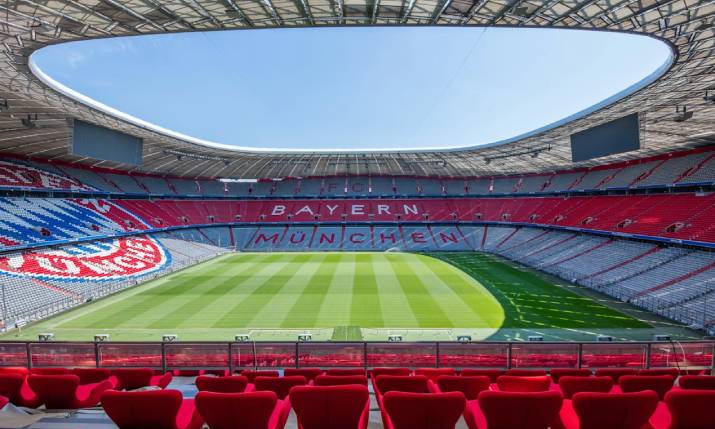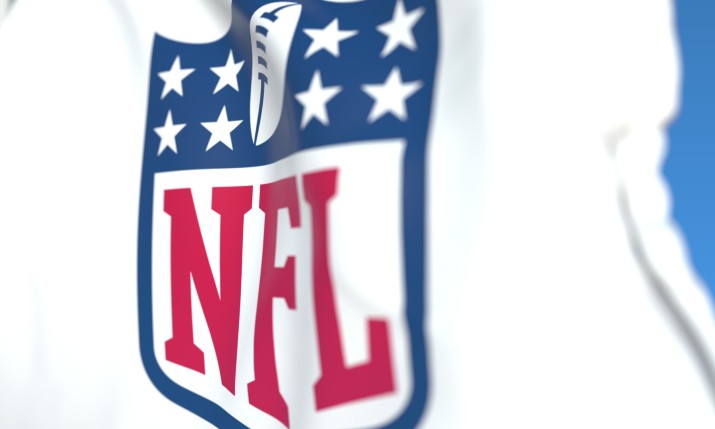NFL seeks a Bavarian rhapsody to grow German fanbase as it builds up to first International Series clash in the country

The NFL is expanding its appeal even further into Europe at the Allianz Arena in Munich on 13 November
The NFL is coming to Germany this month, with a regular season clash between the Tampa Bay Buccaneers and the Seattle Seahawks set to take place on 13 November in Munich.
As well as bringing a bit of Bavarian culture to viewers in the US and worldwide, NFL Media is also looking to ride high on the growing popularity of American Football in Europe and – in common with major leagues in other sports – is seeking to widen that appeal.
“It’s the first time the NFL has been to Munich, so there’s some excitement over that, but research shows us that it’s a very engaged fan base, going back to NFL Europe [a transatlantic league that ran from 1989-2007],” says Mark Quenzel, SVP at NFL Media. “They’re very passionate, which is great, because it also makes it an educated fan base. You don’t have to – hopefully – teach them the game.”
This is important for the actual broadcast production, says Quenzel, as the game in the Allianz Arena won’t just be for a German audience.
“It’s a full ‘national’ game and it should feel that way; it gets distributed everywhere,” he adds. “The game is on at 9.30 in the morning, Eastern Time in the US. It needs to hold up against comparisons with [NFL productions] Sunday Night Football, Monday Night Football and Thursday Night Football. You’re still doing a broadcast of a National Football League game, which, by the way, happens to have Tom Brady in it.”
“I think the challenge for the International Series, and certainly for this, is that it’s an event, but it’s also a game, and you’ve got to keep your eye on the ball, no pun intended,” he continues. “The challenge, or the opportunity, is always to ‘event-ise’ the game without losing your coverage of the game.”
Quenzel feels this isn’t just about what the viewer sees on the screen. “To me, what’s always defined a game that feels like a big event is not actually the pictures. It’s the sound. I think people probably don’t even realise it, but when it sounds big, it’s almost more important than the pictures.
“To me, what’s always defined a game that feels like a big event is not actually the pictures. It’s the sound. I think people probably don’t even realise it, but when it sounds big, it’s almost more important than the pictures”
“We have spent so much time in London and now in Germany coming up with an audio plan. It’s not just the big dull roar. It’s the separation of the crowd from what’s happening on the field, to the quarterback calling the play; all that has to feel big, but it also has to feel defined. It should have almost a wraparound feel. So we spend more time creating the audio for the show, than the video. It’s so important for us to make sure that it’s not just big audio, it’s the right kind of big audio. To me that that defines more than anything else if your audience will feel like it’s an event.”
 Football frenzy
Football frenzy
Another factor in the big event feel is the build-up to the game on TV. Traditionally, the NFL Network’s pre-game and post-game shows, including those for the UK and Mexico-based games of the International Series, come live from NFL Media HQ in LA. This time the whole pre-game production team and talent are heading to Munich, to do the show live from Germany. The Good Morning Football show that runs all week leading up to the game will be based in a converted bank in the city, a pop-up studio that looks onto Marienplatz, a central square in the city.
“I’ve always said that even if it’s a Super Bowl, like Phoenix this year, and certainly Las Vegas in two years, our job is always to take our audience to the location,” says Quenzel. “What would you see, what would you hear, what would you feel, if you were here? We’re going to spend a lot more time talking about German culture and the city, giving it the wraparound feel so it’s as if you were here. And not just if you were in the Allianz Arena, but also if you’re in a bar; Munich apparently does not lack for them,” he smiles.
“We’re making sure that we have a plan that allows us to cover the game, but also bring in all the elements that go with holding the first-ever game in Germany,” he adds. “The pageantry that goes with it, the fans inside and outside the stadium, to give a sense of not just Munich, but Germany overall, that extends way beyond the stadium. We’re going to spend some time doing things in Marienplatz, being there in the architecture, understanding German fans and the culture.”
Bringing a US institution live from Bavaria does pose challenges, not least in terms of differing commentary and editorial decisions between the NFL Network and rights holding broadcasters. “With a partner, whether it’s in England or Germany or wherever it happens to be, and [programming cuts to] the game with a different set of announcers, it becomes a delicate balancing act,” he says. “[We] must be cognizant that our audience in the States, which is our primary audience, of course, knows the sport well, but we must also understand that there is another audience out there who may not know the sport quite as well. So how to not talk over their heads, while at the same time not dumbing it down for an audience that knows it very well?”
“A lot of it is the nomenclature,” he says, adding that some terms can be confusing even when there’s a home game broadcast. “It’s almost become a running joke, but I’ll get on to the analysts here if they use contractions like ‘watch the Mike linebacker’. I’ll tell them, don’t assume everybody knows what the Mike linebacker is. There’s nothing more frustrating for a sports fan than having somebody talk about something that you don’t understand. So we don’t really change the coverage [for international games], but we do try to make sure that we’re giving full descriptions.”
Breakfast in America
It’s obvious that the NFL is working to expand its fan base beyond the US. “We’ve already done that,” says Quenzel. “The games in Mexico City have been successful for a long time. Holding the games in London has been successful. I think we’ll be successful in Munich.”
A close relationship with Deutsche Fußball Liga (DFL), which organises and markets the Bundesliga, has helped. Quenzel says production and content teams from the NFL and DFL have been in meetings over the past weeks to co-ordinate and cross-promote each other. It follows a partnership agreement, signed in September 2022 by NFL commissioner Roger Goodell and DFL CEO Donata Hopfen, to collaborate in key business areas with a particular focus on the US and German markets. Under the agreement, the NFL and DFL will, “increase communication and collaboration in the areas of production, broadcast and programming, digital innovation, and marketing”.
Read more All the bells and whistles: Delivering top flight NFL games with a European twist
Bundesliga clubs will feature on the Good Morning Football show, which will in turn feed a lot of content across the NFL network, such as the nightly NFL Total Access show, as well as provide material for the NFL’s digital and social teams.
“We’ve been having weekly meetings with the German broadcasters and German sports content generators for six months, whether they’re covering the game directly or not,” reveals Quenzel. “For instance, Kurt Warner, who is a Hall of Fame quarterback who works for us will be over there. We’re doing a segment with him and a former German soccer player who is also now an announcer.”
This will take the format of the two sports pundits comparing performance analysis techniques of the games using telestrator tools.
“All the content we collectively generate is going to be available to their platforms and our platforms,” says Quenzel. “Their goal, obviously, is to have their audience understand American football, but like every other league in the world, they want to become more recognised in the United States. So we’re part of the exchange programme so to speak.”
“There’s also a responsibility on us,” he adds. “We have to say: here’s the environment we’re in, where soccer is a big deal, so learn a little bit about soccer while you’re [watching NFL].
“It’s the same as NFL fans here [in the US]: many of them aren’t just NFL fans, they’re baseball fans, they’re basketball fans. We want to draw that comparison. So we’re going to talk about European football and, trust me, we wouldn’t be doing that in the States. We’re going to spend a lot of time in and around the city, including the pre-game show, talking about what’s happening, about how people are feeling.”
A Bayern Munich game in the Allianz Arena on the Tuesday before the NFL game will feature highly, as well as no doubt posing some challenges for the NFL production team in the Arena ahead of the weekend.
“ESPN has the right to the Bundesliga coverage in the US, and they’re covering this Bayern Munich game, so it’s going to be live in the States,” Quenzel notes. “So we’re seeing what we can do together; a lot is going on there.”
The recent NFL-DFL partnership announcement revealed that Germany will host one regular season NFL game in each of the next four years, alternating between Munich and Frankfurt. In that light, it’s not that surprising to find that NFL Network’s pre-game show will feature a ‘watch party’ in a Frankfurt bar, with live links during the game.
“We’re sending a reporter there [for the November game] and we’ll be doing a fair amount in Frankfurt,” he adds. “It’s not just a [single] shot; the idea is also to broaden things [out with] Munich, to the state of American football in Germany overall.
“Depending on a few things, we will have the ability to cut to the watch party during the game, such as to watch reactions to a touchdown live. Hopefully there will be at least one!”

